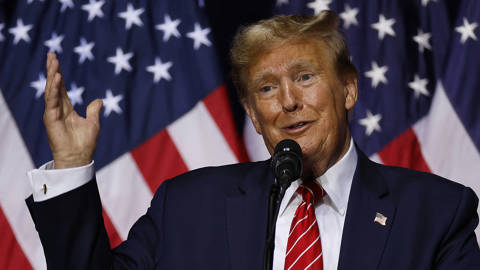Anu Bradford
Says More…
This week in Say More, PS talks with Anu Bradford, Professor of Law and International Organization at Columbia Law School and the author, most recently, of Digital Empires: The Global Battle to Regulate Technology.
Project Syndicate: In 2021, you wrote that, with the United States, China, and the European Union “all looking to crack down on Big Tech, the industry is bracing for impact in 2022.” More recently, however, you lamented that the US government’s “regulatory rhetoric has not been translated into any concrete reforms,” owing to factors like corporate lobbying and political dysfunction. How is this lack of progress affecting the innovation landscape in the US, and what rules or regulations stand the best chance of being implemented?
Anu Bradford: The conversation in the US has lately been characterized by greater skepticism about self-regulation by tech companies. Disillusioned with free markets, toxic online speech, data-privacy violations, threats to democracy, and other harms associated with unregulated tech companies, many Americans want Congress to tighten regulation of the digital economy. But, as I previously pointed out, corporate lobbying and political dysfunction have prevented public sentiment in this area from being translated into meaningful legislation.
This seems unlikely to change any time soon. The introduction of a federal privacy law seems unlikely, as does any meaningful reform of Section 230 of the Communications Decency Act, which shields platforms from liability over content moderation. While reform of antitrust laws may seem more feasible, several carefully drafted bills have stalled in Congress.
The US is even lagging when it comes to regulating artificial intelligence, despite calls from ardent techno-optimists and AI developers to implement guardrails for the technology’s development. The European Union, by contrast, is preparing to pass the AI Act, the world’s first comprehensive AI legislation.
For the US, the issue often comes down to innovation. The US views maximizing a technology’s innovative potential as essential to preserve its lead in the tightening technological “arms” race with China – a race in which AI is particularly important. It will be difficult to reach consensus on any digital regulation that risks hampering this effort.
PS: While China is also committed to winning the technology race, it has not shied away from regulating the digital economy. In your new book, Digital Empires: The Global Battle to Regulate Technology, you describe the Chinese regulatory model as having “many features that are unique to its digital authoritarian governance regime” as well as “some elements of the European rights-driven and the American market-driven regulatory models.” How effectively has China’s government balanced these approaches, and what can the US and the EU learn from its efforts?
AB: The Chinese government’s regulatory strategy is guided by the economic and geopolitical imperative to turn China into a technological superpower. The Communist Party of China (CPC) also uses technology for censorship and surveillance, in order to maintain social stability and unrivaled political control.
But China shares some policy objectives with the EU. Both believe that large tech companies exert too much power over individuals, abuse their market position, and exploit user data. These concerns have led China, much like the EU, to strengthen its antitrust regulation and impose exacting data-privacy rules.

Winter Sale: Save 40% on a new PS subscription
At a time of escalating global turmoil, there is an urgent need for incisive, informed analysis of the issues and questions driving the news – just what PS has always provided.
Subscribe to Digital or Digital Plus now to secure your discount.
As for the US, the commonalities lie in the drivers of the tech industry’s development. Chinese tech giants are built on venture capital – including from the US – more than on state subsidies, meaning that China’s tech prowess also rests largely on market-driven foundations. And yet, China’s culture of thriving innovation has emerged in a context of digital authoritarianism.
Indeed, over the last decade, China has shown the world that, contrary to prevailing perceptions in the West, political freedom is not a prerequisite for technological progress. This has also made it harder for the US to challenge the view, pervasive among authoritarian-leaning governments, that one does not have to sacrifice political control for the sake of innovation.
PS: It is the EU, you note in Digital Empires, that has become “the most powerful regulator of the digital economy.” Interviewing Margrethe Vestager for PS in 2021, you asked about the ambitious legislative and regulatory packages it was pursuing. Have such efforts met – or even exceeded – expectations? If you were to sit down with Vestager again today, what recent developments, breakthroughs, or blind spots with regard to the EU’s efforts at digital regulation would you ask her to address?
AB: The EU’s recent legislative activity has been impressive, with ambitious laws such as the Digital Markets Act and the Digital Services Act being passed in record time. The AI Act – another world-leading piece of legislation – is expected to be adopted later this year.
In Digital Empires, I argue that the EU is likely to convince many governments – at least in the democratic world – that its rights-driven regulatory model is better suited to govern today’s digital economy than America’s market-driven model. But the book also cautions that a European victory in this battle of values may be a hollow one, if the EU cannot also win the battle of outcomes by enforcing its regulations effectively.
Given China’s success in reining in its tech companies, the stakes are high. If the EU fails to show that it, too, can exert control over the tech industry, the inevitable conclusion will be that governing the digital economy is the preserve of authoritarians (in China) or tech companies themselves (in the US and the EU) – not democratic governments.
BY THE WAY . . .
PS: In Digital Empires, you describe the “horizonal battles” between the US, China, and the EU, from the US-China tech war to the US-EU regulatory contest. These battles complicate – and are complicated by – the “vertical battles vis-à-vis the tech companies operating in their markets.” How do these battles intersect, and how can governments reconcile the “various, and at times conflicting, imperatives” that they create?
AB: In the horizontal battles, the competing governments still need each other, in order to protect their tech firms’ commercial interests abroad. Consider the unfolding US-China tech war: the US government wants to hamper China’s technological progress, but it also needs to preserve US companies’ access to China’s large and lucrative market.
The US export-control regime illustrates this tension well: because a complete export ban would carry high costs, US firms can secure a special license to export sensitive technologies to China. Likewise, when the US Congress recently debated more assertive antitrust action, leading US tech companies warned that overzealous regulation would hamper their ability to compete with the Chinese tech giants.
These interconnections often lead to a strategy of restraint, with periods of escalation being punctuated by periods of de-escalation. This dynamic keeps the conflict persistent, yet ultimately manageable, both preventing a full-blown tech war from erupting and keeping a lasting truce at bay.
The US-EU battles are similarly shaped by conflicting imperatives. For example, the US opposes many EU regulations targeting US tech companies, but has an incentive to de-escalate transatlantic tensions, as it needs the EU to join it in its battle against China.
PS: You say that the battle between the US and the EU over “how to balance citizens’ fundamental rights with the government’s critical national security interests” has had “far-reaching economic, legal, and policy consequences.” How has this battle complicated transatlantic data flows, and which solutions hold the most promise?
AB: The EU often prioritizes the fundamental right of individuals to data privacy over the national-security concerns of governments. In the US, privacy safeguards are much weaker, and government surveillance is more extensive. This has led Europe’s highest court, the Court of Justice of the EU, to restrict data flows to the US, which complicates transatlantic data transfers. This generates uncertainty and imposes costs on firms that operate in both markets.
Both sides have an incentive to remove constraints on data flows, but any political compromise is vulnerable to another legal challenge before European courts. While many privacy advocates argue that the only acceptable solution is for the US to adjust its surveillance practices and strengthen privacy protections, others warn that this could create vulnerabilities at a time of heightened geopolitical tensions.
There is another solution: forced data localization in Europe. But this would be highly costly, and would risk legitimizing other governments’ restrictive data laws and fueling techno-nationalism everywhere.
PS: China’s influence over the digital economy stems largely from its provision of necessary “infrastructure and foundational technologies” – essentially the “backbone” for countries’ digital ecosystems. What factors are contributing to the global adoption of Chinese technologies, and what long-term effects is this trend likely to have?
AB: China’s government is eager to help Chinese companies expand their global footprint. This not only supports China’s quest for technological leadership, but also, many warn, enables the Chinese government to gain access to sensitive foreign data.
Yet global demand for Chinese digital infrastructure is significant. Countries embrace Chinese technologies because they offer an affordable path to digital development. Moreover, at a time of rising authoritarianism, many governments are less concerned about being exposed to surveillance by China than they are eager to implement Chinese-style surveillance practices themselves.
The US and its allies fear that, in the long term, this will pull more countries further into China’s orbit and cause digital authoritarianism to proliferate. That would fundamentally challenge the open and global digital economy that was supposed not only to drive economic progress, but also to increase political freedom everywhere.




